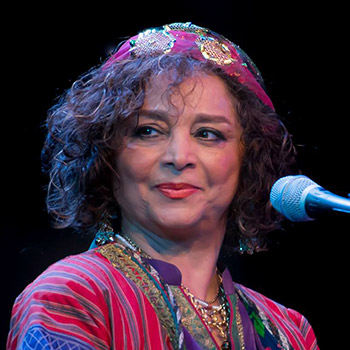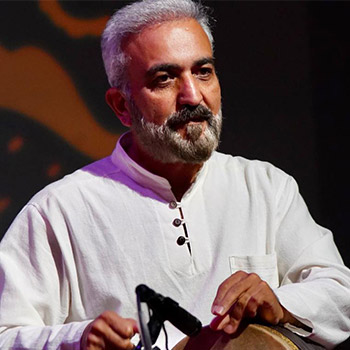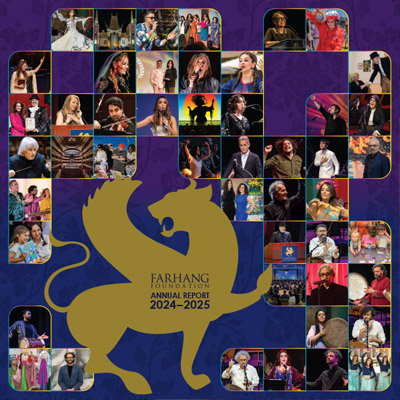Sima Bina
Mast

Presenting the World Premiere of “MAST”
by the grande dame of Iranian Folk Music
the one and only
Sima Bina
Thursday, May 29, 2025 - 11AM
Exclusively for Farhang Performances
Experience the mesmerizing world premiere of MAST, the new single by the legendary Iranian vocalist and the grande dame of Iranian folk music, SIMA BINA. Known for her masterful preservation and reimagination of Iran’s regional folk music, Sima Bina delivers a powerful and soulful performance in this latest release, blending tradition with contemporary expression.
"In the spring of my youth, in the year 1975, I journeyed with my father to our ancestral land, Khorasan, a realm veiled in the mists of childhood memory. I was in search of lost melodies, songs hidden in the everyday rhythms of simple, soulful people.
One day, we were invited to a wedding deep in the Afkash mountains. The path was rugged and winding, leading us to the village elder’s home and the warm-hearted folk of that secluded hamlet. Amid the joyous celebration, an old man rose. With a daf in hand, his voice, like a breeze from eternity, stirred my soul.
The next day, I visited him. His name was Ows Ramazoon — a living archive of ancient songs, the guardian of our land’s forgotten melodies. Among all he sang, one piece, Mast (The Ecstatic), took root in my heart.
I kept it close for years, like a cherished secret, until one day I entrusted it to my son, Arash. In a different musical world, with his jazz guitar, he breathed new life into it. Later, upon the suggestion of my dear friend Mehrdad Arabifard, Mast was reborn with a fresh arrangement.
This song is not only an heirloom of the past, it is a light for the days ahead. A mystical melody, born of the earth, rising toward the sky."
Sima Bina
Producer, Daf, Percussion: Mehrdad Arabifard
Arrangement, Guitar, Bass: Arash Mitooie
Director: Sam Javadi
Mix and Mastering: Hamed Poursaee
Camera: Mojtaba Yazdizade, Sam Javadi
About Sima Bina

Sima Bina is an iconic figure in Iranian folk music, widely regarded as the only artist of her generation who discovered and revived many forgotten melodies, inspiring generations of musicians and preserving an essential part of Iran’s cultural heritage.
Born on December 23, 1945, in Khorasan, Iran, Sima Bina is considered the grande dame of Iranian folk music, a songwriter, and researcher. She is celebrated for her lifelong dedication to preserving and promoting Iranian folk music and culture.
Bina’s passion for folk music began in childhood, shaped by the traditional melodies and rhythms that surrounded her upbringing. She started singing at an early age and soon became fascinated by the diverse musical expressions found in Iran’s many regions.
Her professional career began in the 1960s, when she started performing publicly and recording albums. Her distinctive voice and authentic interpretations of regional songs quickly earned her recognition both in Iran and internationally.
Throughout her career, Bina has traveled extensively across Iran, collecting and documenting folk songs directly from local musicians—an ambitious and groundbreaking effort that preserved countless melodies from extinction. Her repertoire spans a wide range of ethnic and regional traditions, from Kurdish lullabies to Baluchi ballads, each performed with deep respect and scholarly insight.
Beyond performance, Bina is also a dedicated educator and musicologist. She has published research on Iranian folk traditions and has lectured at cultural institutions and universities around the world, becoming a bridge between Iran’s oral traditions and global academic communities.
Her influence reaches far beyond her own work. Sima Bina has mentored and inspired many musicians across generations, playing a vital role in the revival and renewed appreciation of Iranian traditional music.
Despite the cultural restrictions placed on women in post-revolutionary Iran, particularly during the 1980s and 1990s, Bina showed extraordinary resilience. At a time when public performances by women were severely limited, she organized music workshops and quietly taught traditional music to Iranian women, often in private and at personal risk. These efforts not only safeguarded a fading musical heritage but also empowered a new generation of women to find their voice through music.
Sima Bina’s legacy is one of cultural preservation, artistic excellence, and quiet resistance, a testament to the enduring power of music to transcend political and social barriers.
Despite facing challenges and restrictions in her homeland, Bina has remained steadfast in her commitment to preserving and promoting Persian folk music. Her contributions to Iranian cultural heritage have earned her numerous accolades and awards, solidifying her legacy as one of Iran's most beloved folk singers and cultural ambassadors.
Discover Sima Bina
 |
 |
 |
 |
 |
About Mehrdad Arabifard

Mehrdad Arabifard is a producer, composer, and scholar specializing in Iranian percussion. He began his formal musical education at the Center for the Preservation of Music in Tehran (1980–1987), where he studied under masters such as Ostad Morteza A’yan and later Ostad Amir-Nasser Eftetah. Even as a teenager, Arabifard was a prolific student, simultaneously studying kamancheh and violin with Mohammad Moghadassi.
He went on to study Iranian violin and the Radif of Saba under the guidance of Mohammad Moghadassi and Reza Rahimi Jafari, as well as the traditional Radif with Dovoud Ganjeie. His classical violin training continued with Rubin Tahmassians and “Joe” Ovsep Ketendjian, alongside instruction in music fundamentals with Mehdi Javanfar.
Known for his clear and crisp Tombak technique, Arabifard is one of the rare musicians to master both traditional and contemporary approaches to the instrument—seamlessly incorporating both styles into his work as a soloist and accompanist. His 3-volume Tombak instruction manual, published in 1990, remains one of the most highly regarded resources in the field.
As a passionate educator, Arabifard is the founder of the Persian Drums Institute in Los Angeles. He emphasizes that percussion is more than rhythm, it is music. His unique teaching philosophy encourages students to engage deeply with the musicality of their playing, a method that has helped many of his students become top competitors at the Fajr Music Festival, an international event affiliated with UNESCO.
In addition to his educational contributions, Arabifard has had an extensive career as a composer, arranger, and performer, with credits on more than 60 albums. He has collaborated and performed with some of Iran’s most revered musicians, including Ostad Hassan Kasaie and Ostad Jalil Shahnaz, appearing with them in numerous concerts.
His contributions also extend into film music. Arabifard recorded percussion for major Hollywood productions such as The Passion of the Christ (nominated for Best Original Score at the 2004 Academy Awards), Hidalgo, Helen of Troy, andJack Reacher 2: Never Go Back. He also composed, arranged, and performed the full score for Babak’s First Norooz, the first Iranian-American animated film, and produced the acclaimed musical project Maman Shamsi’s Love Songs in honor of his mother.
He is the author of Daf & Taraneh, a Daf and songbook published by the Jordan Center for Persian Studies at UC Irvine, now used by students worldwide.
Arabifard’s work has been recognized with numerous awards from institutions such as the Daytona Beach Symphony Society, the University of Borneo, the City of Madrid, and the City of Nicosia in Cyprus. He is a recipient of the Master Musician Fellowship Award from the Durfee Foundation and was nominated for the U.S. National Endowment for the Arts (NEA) award in 2022.
From 2016 to 2021, Arabifard served as the Co-Director of the Music of Iranian Ensemble at UCLA and is credited as the founder of Iranian percussion classes at the university’s Herb Alpert School of Music.
Discover Mehrdad Arabifard
 |
 |
 |
 |
About Arash Mitooie

Born in 1970, Arash Mitooie is one of the leaders of Iranian rock music after the 1979 revolution. Son of the legendary Iranian folk singer and researcher Sima Bina, he was exposed to both Iranian and Western music since childhood and became familiar with playing the piano and setar (an Iranian traditional string instrument). From a young age, Arash picked up the guitar and began learning Western music. In the 1990s, despite the bans in Iran, Arash held private concerts underground with a group he had formed and produced several albums in which he experimented with fusing Iranian music and poetry with Western rock, rock and roll, and blues. Since then, Arash has been constantly performing concerts, recording works, and collaborating with other famous artists. He is known for his unique and original style in fusing Iranian and Western music and playing Iranian melodies with the guitar.
Discover Arash Mitooie
 |
 |
 |
 |
Help support Farhang Foundation’s free programming!






